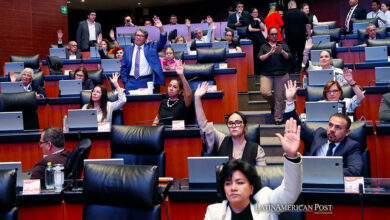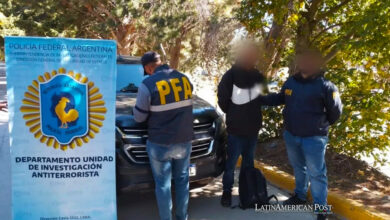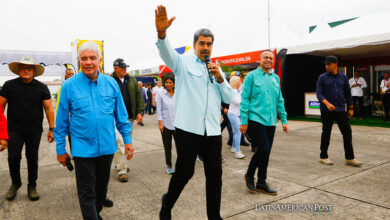The socialist leader has been criticized for many years for his closeness to the Venezuelan regime .

On May 4, one of the most important elections in Spain will be held: the vote for the next mayor of the capital. Photo: TW-PabloIglesias
LatinAmerican Post | Santiago Gómez Hernández
Listen to this article
Leer en español: Pablo Iglesias: el pasado chavista del candidato a la alcaldía de Madrid
On May 4, one of the most important elections in Spain will be held: the vote for the next mayor of the capital. Among the figures competing for the position are: Ángel Gabilondo from the PSOE, Isabel Díaz Ayuso from the PP, Edmundo Bal for Ciudadanos, Mónica García from the More Madrid Movement, Rocío Monasterio for the far-right VOX party, and Pablo Iglesias from Unidas Podemos.
Among this broad political panorama, several names stand out, such as the former vice president of the Spanish Government, Pablo Iglesias. This skinny politician, with a well-known ponytail and a speech that has managed to captivate the young left, is also a well-known socialist politician who has been criticized for his closeness to Venezuela.
Iglesias was the leader of that revolution that he caused 10 years ago when he broke into politics with his Podemos Movement. That party, born of the disenchantment of several Spaniards by the economic crisis caused by the Spanish bipartisanship, gave space to a group of a more radical left than the PSOE.
However, and despite his great support in progressive sectors, one of his greatest criticisms has been his support for Latin American socialist governments, especially the Chavista regime in Venezuela.
In particular, during 2012, when he was a professor of Political Science at the Complutense University of Madrid and expressed his support for the policies promoted by Chávez. Although, the political closeness of various European left movements (including United We Can) with Latin American left movements has always been evident, including 21st-century socialism, personified in Chavismo.
But, the rejection of the majority of the Venezuelan diaspora to the figure of Iglesias is not only because of his political support but also because of alleged financing that he would have received from the Venezuelan Government at the founding moments of Podemos.
According to conservative and right-wing Spanish and Venezuelan media, they have detailed that the Chavista government, from 2008 and 2009 received advice from the Foundation Center for Political and Social Studies, of which Iglesias was a part. Although there is also an attempt to link him with illegal financing of his party or of his campaigns with foreign governments (Venezuela or Iran), none of these accusations has had reliable evidence to support them and it has not gone from being a recurrent attack by his political adversaries.
In recent years, and in the face of the obvious and resounding disaster in Venezuela's economic policy, Iglesias has set a distance. Of course, being a faithful believer in the autonomy of Venezuelans and their Government and the little international interference, represented in facilitators of a negotiated solution.
Also read: Tax Reform: Blessing or Curse for Cinema in Colombia?
Threats in the campaign
If there is something certain, it is that these Madrid elections will pass as one of the most controversial and distorted in Spanish history, since the end of the civil war and the conflict against ETA. During this campaign, Iglesias has been the target of threats, as has the Minister of the Interior, the general director of the Civil Guard, María Gámez, and the head of Industry, Reyes.
The most recent victim to receive these threats is Díaz Ayuso. The Catalan police intercepted a mail with bullets that were intended for Madrid politics. Ironically, Ayuso had stated on the issue of threats that "an unnecessary light is being given," indirectly criticizing the left movements (PSOE, United We Can, and More Madrid).
Pablo Iglesias abandona el debate de la Cadena SER porque se niega a participar con Rocío Monasterio, quien pone en duda la carta que recibió con una amenaza de muerte: "Estáis cometiendo un error blanqueando que esta gente pueda estar aquí" pic.twitter.com/DxoZBzY0T8
— El HuffPost (@ElHuffPost) April 23, 2021
Recently, and due to this type of action, Iglesias withdrew in the middle of a debate organized by the SER network, after the leader of the far-right party, VOX, did not agree to specifically reject the threats he had received. same. The conservative leader considered the threats to Iglesias little credible. "I don't believe in Pablo Iglesias. I think that all Spaniards, every time we see something that Pablo Iglesias says, we put it in doubt," said the VOX candidate.





